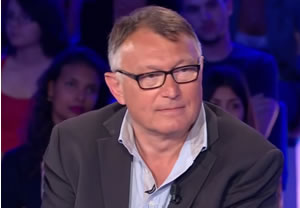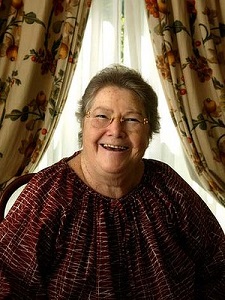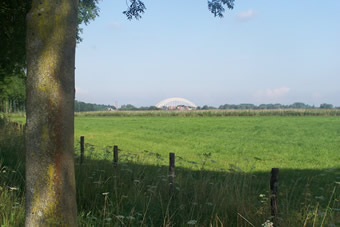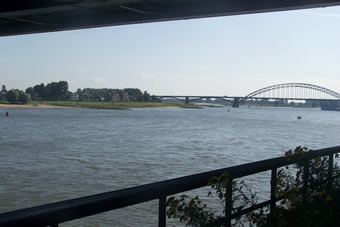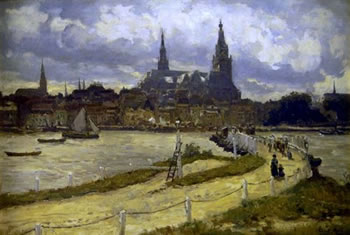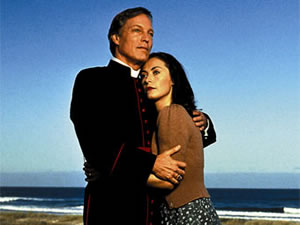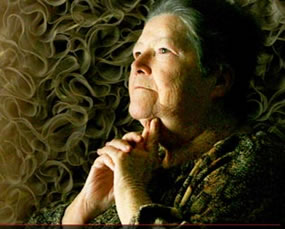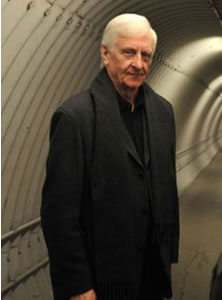De Franse schrijver en journalist Patrick Besson werd geboren op 1 juni 1956 in Montreuil. Zie ook mijn blog van 1 juni 2007 en ook mijn blog van 1 juni 2008 en ook mijn blog van 1 juni 2009.
Uit: Mais le fleuve tuera l’homme blanc
« Je la reconnus dans la file d’attente du contrôle des passeports, bien que l’unique photo d’elle jamais parue dans la presse datât de 1985. Elle était habillée en homme comme lors de son arrestation au siècle dernier. Ses cheveux courts étaient désormais gris. Derrière les lunettes rondes à monture d’acier de Trotsky que portaient toutes les filles myopes de sa génération – elles avaient arrêté, pourquoi pas elle ? –, on trouvait les mêmes grands yeux vides, apeurés, actifs. Sa file avançait plus vite que la mienne. Elle avait dû décrypter les vêtements, le comportement, les bagages à main et le visage de chaque personne attendant de passer la douane. Evaluer les chances que chacun avait, ou non, de retenir l’attention du douanier. Puis faire un rapide calcul mental et choisir la bonne file. Ce petit travail lui avait permis de gagner quelques minutes sur moi. Ces minutes qui vous sauvent parfois la vie. Je la perdis de vue, la retrouvai dans le lounge. Elle voyageait en classe affaires, comme moi. Moi, j’étais dans le pétrole. Dans quoi était-elle à présent ?
Quand je compris que nous prenions le même avion, je me dis que nous serions peut-être assis côte à côte. Elle aurait alors le regard vague et plaintif de toute personne célèbre se demandant si on sait qui elle est. Dans le cas d’une gloire négative due à un fait divers infect, à un acte politique odieux ou à une opération militaire catastrophique, cette question muette se teinte de honte, de crainte. Le personnel de bord nous indiqua, hélas ! deux travées différentes. Pourquoi hélas ?“

Patrick Besson (Montreuil, 1 juni 1956)
De Engelse dichter en schrijver John Edward Masefield werd geboren op 1 juni 1878 in Ledbury, in Herefordshire.
A Ballad of John Silver
We were schooner-rigged and rakish,
with a long and lissome hull,
And we flew the pretty colours of the crossbones and the skull;
We’d a big black Jolly Roger flapping grimly at the fore,
And we sailed the Spanish Water in the happy days of yore.
We’d a long brass gun amidships, like a well-conducted ship,
We had each a brace of pistols and a cutlass at the hip;
It’s a point which tells against us, and a fact to be deplored,
But we chased the goodly merchant-men and laid their ships aboard.
Then the dead men fouled the scuppers and the wounded filled the chains,
And the paint-work all was spatter dashed with other peoples brains,
She was boarded, she was looted, she was scuttled till she sank.
And the pale survivors left us by the medium of the plank.
O! then it was (while standing by the taffrail on the poop)
We could hear the drowning folk lament the absent chicken coop;
Then, having washed the blood away, we’d little else to do
Than to dance a quiet hornpipe as the old salts taught us to.
O! the fiddle on the fo’c’sle, and the slapping naked soles,
And the genial “Down the middle, Jake, and curtsey when she rolls!”
With the silver seas around us and the pale moon overhead,
And the look-out not a-looking and his pipe-bowl glowing red.
Ah! the pig-tailed, quidding pirates and the pretty pranks we played,
All have since been put a stop to by the naughty Board of Trade;
The schooners and the merry crews are laid away to rest,
A little south the sunset in the islands of the Blest.

John Edward Masefield (1 juni 1878 – 12 mei 1967)
De Oostenrijkse schrijver Ferdinand Raimund werd geboren op 1 juni 1790 in Wenen.
Uit: Der Bauer als Millionär
“Großer Feensaal, mit magischen Lampen von verschiedenen Farben hell beleuchtet, welche, auf Kandelabern angebracht, die Kulissen zieren. Im Hintergrunde die Öffnung eines großen Bogentores, welches durch einen schalartigen, mit Gold verbrämten Vorhang verdeckt ist.
In der Mitte des Theaters spielen zwei Furien, ein Triton und der kleine Borax ein Quartett von zwei Violinen, Viola und Violoncello. Die Stimmen des Quartetts wechseln mit Solo. Die Instrumente sind von Gold, die Pulte ideal. Im Kreise sitzen: Bustorius, Zenobius, Antimonia, Selima, Zulma, Lira, der Morgen, die Nacht, der Abend, der Blödsinn und mehrere andere allegorische Personen, Zauberer und Feen, die von Zeit zu Zeit von vier Genien, welche als geflügelte Livreebediente gekleidet sind, auf silbernen Tassen mit Konfekturen bedienet werden. Das Ganze wird von folgendem Chor begleitet.
Chor.
Welch ein herrliches Konzert,
Wo sich hoch die Kunst bewährt.
Was ist Amphions Geklimper?
Selbst Apollo ist ein Stümper,
Wenn man solche Künstler hört.
Bravo! Bravo! O vortrefflich!
Bravo! Bravo! (Verhallend.) Bravo – Bravo –
(Allgemeiner Applaus. – Alles erhebt sich von den Sitzen, die Spielenden legen ihre Instrumente weg und verneigen sich).
Zenobius.
Bravissimo, meine Herren! das haben Sie gut gemacht, (zu dem Triton) besonders Sie.
Bustorius(tritt vor, einen Csakan in der Hand, im ungarischen Dialekt).
Isten utzék! ist das schönes Quartett, von wem ist das komponiert?
Zenobius.
Das Adagio ist von einem Delphin.

Ferdinand Raimund (1 juni 1790 – 5 september 1836)
Monument bij het Weense Volkstheater
Zie voor de twee bovenstaande schrijvers ook mijn blog van 1 juni 2006 en ook mijn blog van 1 juni 2007 en ook mijn blog van 1 juni 2008 en ook mijn blog van 1 juni 2009.
De Duitse schrijver, essayist, journalist, biograaf en uitgever Peter de Mendelssohn werd op 1 juni 1908 in München.
Uit: Thomas Mann: Tagebücher
„15.05.1936
Schönster Früh-Sommertag. Freude an dieser Jahreszeit, die schon die meiner Geburt.-Geschäfte, Korrespondenz. Den Vortrag mit Bermann. Haarwaschung. Mit K. um den Weiher. Russische Bücher [1] kamen, die Emigrantenzeitschriften und das interessante Buch eines Ex-Hitlermannes und erbitterten Wegbereiters: “Ich kann nicht schweigen”. Nachmittags geschlafen. An Reisiger, Fiedler [2] u.a. geschrieben Endlose Briefdiktate u.a. an Knopf und v. Pick (Budapest) [3] in der Frage unserer Wohnung (Hatvanyi). – Exposee von Golo über die Humaniora [4] für Budapest [5]durchgearbeitet. – Bibi bestand mit Auszeichnung sein Lehrexamen, geigerisch; in den theoretischen Nebenfächern schnitt er schlecht ab. Abends keines Fest für ihn in Gegenwart des jungen Kayser, mit Champagner-Getränk. Hörten wieder die “Symphonie in blue”, begabtes Stück von 1920, nach dem nichts mehr kam. Müde. Spät zu Bette.“

Peter de Mendelssohn (1 juni 1908 – 10 augustus 1982)
Hier samen met de Oostenrijkse schrijfster Hilde Spiel
De Australische schrijfster Colleen McCullough werd geboren op 1 juni 1937 in Wellington.
Uit: The Thorn Birds
„Yet over the ensuing months her yearning after Agnes contained nothing of hope; Meggie didn’t own a doll and had no idea little girls and dolls belonged together. She played happily with the whistles and slingshots and battered soldiers her brothers discarded, got her hands dirty and her boots muddy to play with. Stroking the bright pink folds of the dress, grander than any she had ever seen on a human woman, she picked Agnes uptenderly. The doll had jointed arms and legs which could be moved anywhere; even her neck and tiny, shapely waist were jointed. Her golden hair was exquisitely dressed in a high pompadour studded with pearls, her pale bosom peeped out of a foaming fichu. of cream lace fastened with a pearl pin. The finely painted bone china face was beautiful, left unglazed to give the delicately tinted skin a natural matte texture. Astonishingly lifelike blue eyes shone between lashes of real hair, their irises streaked and circled with a darker blue; fascinated, Meggie discovered that when Agnes lay back far enough, her eyes closed. High on one faintly Bushed cheek she had a black beauty mark, and her dusky mouth was parted slightly to show tiny white teeth. Meggie put the doll gently on her lap, crossed her feet under her comfortably, and sat just looking.
She was still sitting behind the gorse bush when Jack and Hughie came rustling through the grass where it was too close to the fence to feel a scythe. Her hair was the typical Cleary beacon, all the Cleary children save Frank being martyred by a thatch some shade of red; Jack nudged his brother and pointed gleefully. They separated, grinning at each other, and pretended they were troopers after a Maori renegade. Meggie would not have heard them anyway, so engrossed was she in Agnes, humming softly to herself.
“What’s that you’ve got, Meggie?” Jack shouted, pouncing. “Show us!”
“Yes, show us!” Hughie giggled, outflanking her.
She clasped the doll against her chest and shook her head. “No, she’s mine! I got her for my birthday!”
“Show us, go on! We just want to have a look.”
Pride and joy won out. She held the doll so her brothers could see. “Look, isn’t she beautiful? Her name is Agnes.”
“Agnes? Agnes?” Jack gagged realistically. “What a soppy name! Why don’t you call her Margaret or Betty?”
“Because she’s Agnes!”

Colleen McCullough (Wellington, 1 juni 1937)
Zie voor de twee bovenstaande schrijvers ook mijn blog van 1 juni 2007en ook mijn blog van 1 juni 2009.
De Argentijnse schrijver Macedonio Fernández werd geboren op 1 juni 1874 in Buenos Aires. Zie ook mijn blog van 1 juni 2009.
Uit:From The Museum of Eterna’s Novel (Vertaald door Margaret Schwartz)
“After Chapter V of the Novel we can be sure that it isn’t because of NK (the Nonexistent Knight) that Sweetheart’s existence is saddened today.” “This evening, the Novel will send its soloist orchestra—six guitars—to execute various obsequious polyphonies for the orchestras of the bars Ideal, Sibarita, and Real, so that they can listen to music for a change. The Polygraph of Silence will explain the reasons for this with erudite gestures, and he will circulate the bottomless collection plate of gratitude among the personnel of the orchestras, which will make the music of thanks as coin strikes against coin. The public will also serve as a harmony of contentment, as the listening orchestra, momentarily laying aside its instruments for calling-the-waiter in favor of its instruments of applause.”
This is a novel that was, and will be, futuristic until it’s written, just as its author is futuristic—until today he had yet to write a single future page—although he has left futurism until the future, as a proof of his enthusiasm, and doing so brilliantly from there on—without falling into the trap of being a consecutive futurist, like those who have adopted futurism, without understanding it, in the present. And, for that reason, they have declared much to come for the novelist, who has everything in front of him, including his own genial sense of haste, which arises from having thought that, given the speed of progress, posterity has been left behind; each day comes quicker, almost completely forgotten, a series of contemporaneous events that exist in the last journalistic edition of the day it appears and that’s it. We all die already judged immediately, book and author are made classics or corpses in a day, and meanwhile they recommend us to posterity and complain about the present. And today, all of this is done with sufficient justice in 24 hours.“

Macedonio Fernández (1 juni 1874 – 10 februari 1952)
Onafhankelijk van geboortedata:
De Nederlandse dichter Dennis Gaens werd geboren in Susteren in 1982. Zie ook mijn blog van 1 juni 2009.
de overburen leunen
de overburen leunen langzaam
mijn studentenkamer naar binnen
elke avond iets verder voorover
het fatsoen om verrekijkers of telescopen
te gebruiken is hen vreemd
ze rennen tegen de ruiten
totdat de muren zich uitrekken
richting mijn raam
– zelfs hun kat klauwt mee –
hun ogen op groot
en een bouwlamp in de aanslag
in hun badjassen rennen ze
met hun oren hard tegen het glas gedrukt
soms rennen ze zo hard
dat ze hun gezichten pletten
en ik me afvraag of ze er blijvende schade
aan overhouden
niet lang meer
dan slaat hun adem
condens op de buitenkant
van mijn raam
ik moet gordijnen kopen
en een baksteen klaarleggen
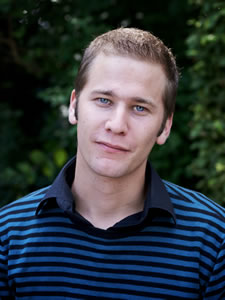
Dennis Gaens (Susteren, 1982)
De Vlaamse dichter en schrijver Jeroen Theunissen werd geboren in Gent in 1977. Zie ook mijn blog van 1 juni 2009.
Het huis
Het huis is helemaal geen huis
het is een gedachte je had er evengoed
kunnen breien of je bril vergeten.
Je had er wel willen wonen
op een verloren pianodag in september
maar het viel in de bladeren stil vroeg.
Met je lila haren je potloodogen
je eeuwige zalige handen
die geen handen zijn maar veeleer een gedachte
lik je de vensters aan scherven.
Toen het huis nog een huis was
heb je er lange nachten gedroomd
maar eigenlijk toen al was het geen huis
als nu een gedachte.
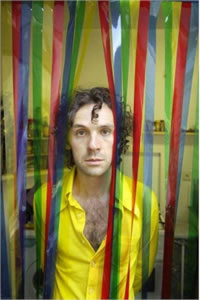
Jeroen Theunissen (Gent, 1977)
